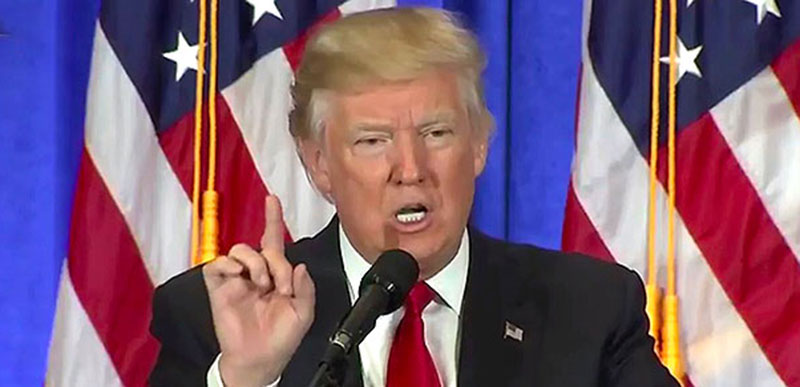Last week we reported that the activist Hawaii judge who tried to stop Trump’s Travel Ban earlier this year ruled that grandparents must be included as a bona fide relationship, that the Trump administration was interpreting the relationship too narrowly.
The Trump administration took that decision to the Supreme Court and won a partial victory:
Here’s the AP’s account of the decision:
The Supreme Court is granting the Trump administration’s request to more strictly enforce its ban on refugees, at least until a federal appeals court weighs in.
But the justices are leaving in place a lower court order that makes it easier for travelers from six mostly Muslim countries to enter the United States.
The high court acted Wednesday on the administration’s appeal of last week’s ruling by U.S. District Judge Derrick Watson that required the government to allow in refugees formally working with a resettlement agency in the United States. Watson also vastly expanded the family relations that refugees and visitors can use to get into the country.
The justices said the federal appeals court in San Francisco should now consider the appeal.
That was written in a positive way.
Here’s what Reuter’s wrote, which is much more negative:
The U.S. Supreme Court rejected on Wednesday a bid by President Donald Trump to block a judge’s ruling that prevented his travel ban on people from six Muslim-majority countries from being applied to grandparents of U.S. citizens.
But in a partial win for Trump, the court put on hold part of the judge’s ruling that would allow more people to enter the United States under a separate ban on refugees if it went into effect.
The brief order said the court’s decision is temporary while the San Francisco-based 9th U.S. Circuit Court of Appeals considers a separate appeal on the same issue. Three of the conservatives on the court of nine justices noted that they would have granted Trump’s request in full.
The Trump administration last Friday asked the high court to overturn a decision on Thursday by a U.S. district judge in Hawaii, which limited the scope of the administration’s temporary ban on refugees and travelers from Iran, Libya, Somalia, Sudan, Syria and Yemen.
And here’s how Bloomberg wrote up the same decision:
The U.S. Supreme Court dealt a blow to President Donald Trump on his embattled travel ban Wednesday, rejecting his bid to bar entry by some people with family members already in the country.
The 6-3 order by the justices — who last month let the president start restricting entry by people from six mostly Muslim countries — means the government must accept people with grandparents, cousins and other relatives in the U.S.
The order gave Trump a partial win on a separate issue, temporarily blocking a lower court ruling that would have opened the way for potentially thousands of refugees to enter the country in the coming months. That portion of the Supreme Court order applies while the administration appeals on that issue to a federal appellate court in San Francisco.
The Supreme Court will hear arguments on the travel ban in October.
Anyone confused yet?
Here’s how our friends at Legal Insurrection explain today’s ruling:
The Supreme Court has ruled on the Trump administration’s Motion for Clarification and for a Stay of the Hawaii Order significantly scaling back implementation of Travel Order No. 2.
The Court denied the request for “clarification,” granted a stay of the Hawaii Order on refugees, and was silent (de facto denial) of a stay as to relatives…
The short version is that after the Supreme Court substantially overruled the first Hawaii District Court and 9th Circuit injunctions against Travel Order No. 2, the Trump administration implemented new rules following the Supreme Court ruling. Most prominently, the Trump administration limited “close familial relations” (who would be exempted from the Travel Order under the Supreme Court ruling) to Parents, spouses, children, siblings, fiancés and sons- or daughters-in-law.
The Hawaii District Court, however, issued a second preliminary injunction expanding who was exempted to “grandparents, grandchildren, brothers-in-law, sisters-in-law, aunts, uncles, nieces, nephews, and cousins of persons in the United States”. The Hawaii court also ruled that mere contact between a refugee and a private U.S. refugee agency was sufficient in and of itself to constitute a bona fide connection to the U.S. so as to exempt such refugees from the Travel Order.
The entire court rejected the concept of “clarification”… The majority stayed only part (as to refugees), but not the absurd expansive definition of close family used by the District Court.
So as William Jacobson explains, the Supreme Court stayed silent on the portion of the Hawaii judge’s order that broadened the ‘bona fide relationship’ to grandparents, etc, while staying the portion of the order where the Hawaii judge “ruled that mere contact between a refugee and a private U.S. refugee agency was sufficient in and of itself to constitute a bona fide connection”.
They also rejected Trump’s request for clarification of their original order on what constitutes a ‘bona fide relationship’.
So it’s basically a partial win for Trump, but a partial loss as well.

